Gilded Age Fireplace Designs
Monumental, Majestic...and Rustic?
Gilded age fireplace designs are especially notable for their imposing size and often lavish ornamentation. Carved from some of the world's most beautiful and sumptuous marbles available at the time, they -- and the grand mansions that house them -- stand as a lasting tribute to out-
standing craftsmanship and the leading architects, designers and artisans that created them!
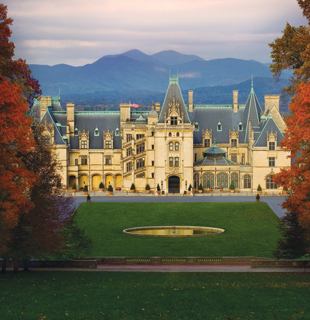
Biltmore House, Asheville, North Carolina
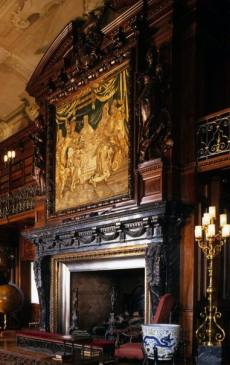
Welcome to one of the most dynamic and transformative periods in U.S. his-
tory, an era that ushered in
many of the highlights and conflicts of modern American life! The
Gilded Age was a period of unprecedented economic
and population growth in the United States from the post-Civil War era to
the dawn of the twentieth century. The production of iron and steel rose dramatically and western resources
like lumber, gold, and silver increased the demand for improved transporta-
tion. Railroad development boomed as
trains moved goods from the resource-
rich West to the East. Steel and oil were in great demand. A tidal wave of
immigrants arrived on American soil to provide the manpower necessary to harvest the abundance of natural
re-
sources, as well as to toil in the steel mills and factories that transformed these natural resources into a
wide
range of useful products.
In the process, immense wealth was created by many of the investors and businessmen involved in these
endeavors. Individuals such as John D. Rockefeller (oil), Andrew Carnegie (steel), and "Commodore" Cornelius
Van-
derbilt (shipping & railroads) accumulated vast fortunes. As was the cus-
tom of the day, many of these
industrialists and/or their heirs were all too eager to display their wealth by building magnificent townhouses
and coun-
try estates. Indeed, the term "Gilded Age," itself, was coined by Mark Twain to describe, i.e.,
ridicule, such ostentatious displays of personal wealth.
It was a time when conspicuous consumption was "in." A time when merely "keeping up with the Joneses" was not enough. Rather, it was imperative among the wealthy to outdo the Joneses -- in a BIG way. In other words, "if you've got it . . . FLAUNT it!"
Fireplace Designs from the Gilded Age
And nobody was better at flaunting it than the descendants of "Commo-
dore" Vanderbilt -- particularly his
grandchildren. Biltmore House (pictured at top, left), in Asheville, North Carolina, was completed in
1895 for George Washington Vanderbilt. Designed by prominent architect Richard Morris Hunt (1827-1895), the
mansion was modeled after French chateaux and encompasses 135,000 sqare feet and 250 rooms -- making it the
largest privately-owned home in America. Still owned by one of Vanderbilt's de-
scendants, it stands today as one
of the most prominent remaining exam-
ples of the Gilded Age in the United States. The marble fireplace design
for the library pictured above right, and directly below, is indicative of the monumental scale and massing of
this majestic architectural jewel.
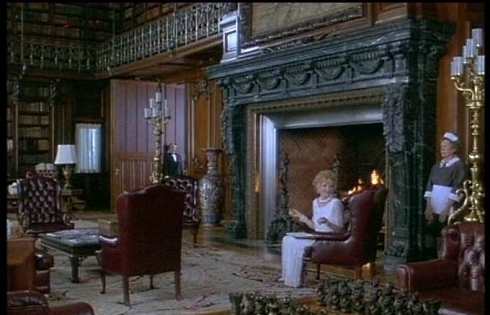
Though George Vanderbilt may have built the largest home in America, many of his older siblings built a
veritable collection of homes -- from mag-
nificent mansions on New York City's Fifth Avenue (since razed) to
extrav-
agant summer homes throughout the Northeast. However, the undisputed capital of America's Gilded Age
was Newport, Rhode Island -- the location of some of the most opulent of the Vanderbilt mansions.
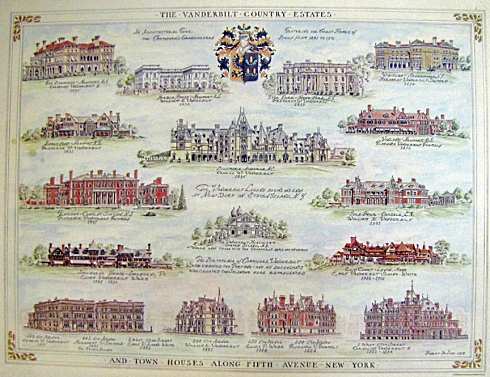
The marble-walled dining room and gilded ballroom that follow (left and right, respectively) are just two of
the lavishly appointed rooms in the apt-
ly named Marble House, pictured in the second row, below.
Commissioned by William K. Vanderbilt as a birthday present for his wife, Alva, it was in-
spired by the Petit
Trianon at
Versailles and, once again, was designed by architect Richard Morris Hunt.
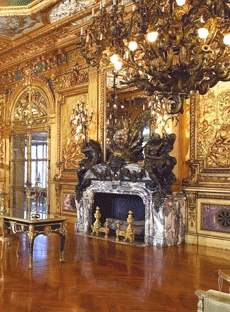
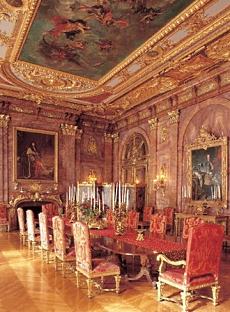
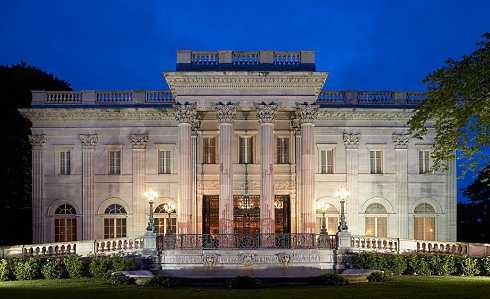
The grandest Gilded Age mansion in Newport was completed in 1885 for yet another Vanderbilt brother. Modeled after an Italian Renaissance palace, The Breakers (pictured below) was commissioned by Cornelius Vanderbilt II, namesake and grandson of the "Commodore." The architect? None other than the prolific and extremely talented Richard Morris Hunt.
The fireplace designs (second row) pictured below the exterior image of The Breakers include a regal hooded design in the dining room (left) and a uniquely colored marble and gilt mantelpiece in the music room (right).
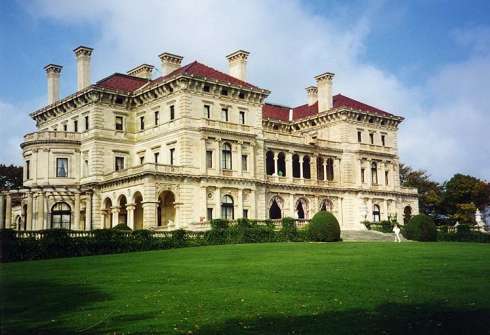
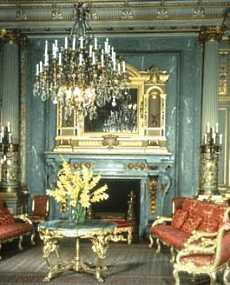
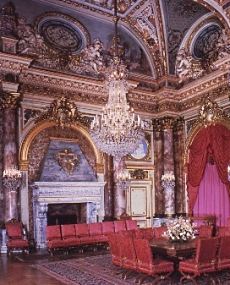
The magnificent wood-paneled library that follows is anchored by an ex-
traordinary antique
Caen stone fireplace imported from France for The Breakers.
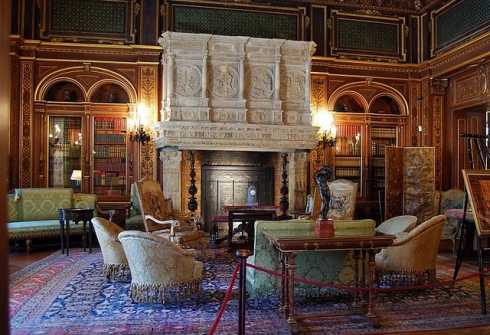
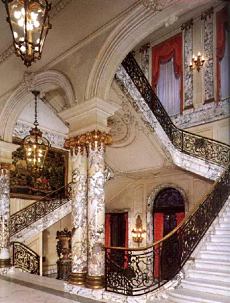
In keeping with the popular French design of the period, the images at right and below depict another
French-inspired Newport treasure,
The Elms, completed in 1901. De-
signed by architect Horace Trum-
bauer
(1868-1938), the home was modeled after the Chateau d'As-
nieres in Asnieres - sur - Seine,
France for coal baron
Edwin Ber-
wind. Note the magnificent con-
trasting colored marble fireplace surround in the wood carved and
paneled dining room.
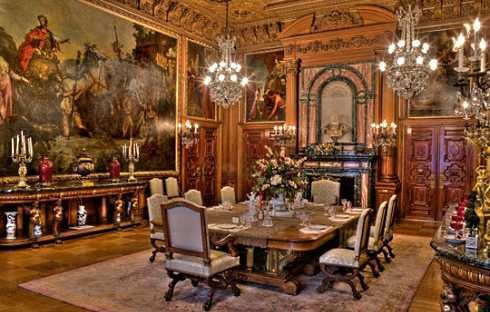
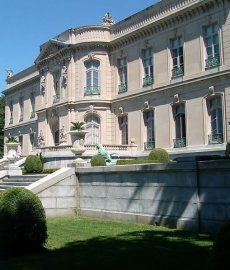
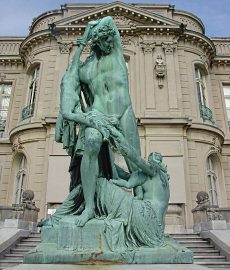
Perceptions aside, all the gold and glitter portrayed above does not tell the entire story of the tastes and preferences of the Gilded Age's wealthy. After all, everyone needs a break now and then. As with many of us, contemporaries of the Gilded Age also enjoyed getting away from it all by going "camping" in the mountains and deep woods. And fortunately, the beautiful Adirondack Mountain region of upstate New York provided a perfect setting and escape from the hustle and bustle of everyday life. However, "roughing it" in the Adirondacks was a much different experience for the wealthy of the Gilded Age than for those less privileged.
The image below with the rustic stone fireplace design only hints at how the capitalists and captains of industry "toughed it out" in the wilderness during the Gilded Age . . . . .
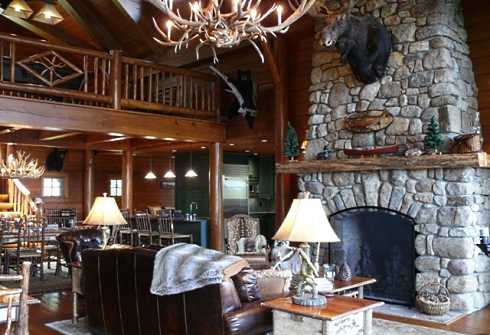
Click here to see the "rustic side" of Gilded Age wealth
Please check back often or subscribe to our RSS feed, as we fre- quently add new images of fireplace designs to our site.
YOU MAY ALSO LIKE:
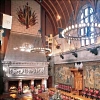
MORE Gilded Age Fireplace Designs -
Timeless Classics!
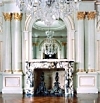
Fireplaces Mantles & Mansions -
A Return To Classic Grandeur!

Roughing It -
American Gilded Age Style!
Back to Antique Fireplace Mantels
Back to Standout Fireplace Designs Home Page
Didn't find what you were looking for?
Use this search feature to find it.
LIKE THIS PAGE?
Use this search feature to quickly find the information you're looking for.
Related Pages
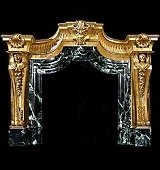
Antique Fireplace Mantels
Gilded Age Glory!
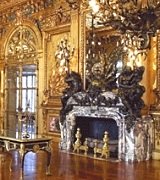
Gilded Age Fireplaces
Monumental, Majestic...
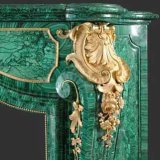
Regal Fireplace Mantels
Fit for a King...
OR a Queen!
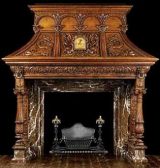
Westland London
Extraordinary
Antique Mantels!
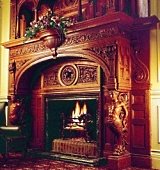
Antique Fireplace Mantels
Old Flames Never Die!
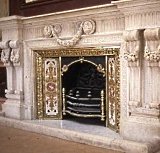
The Antique Fireplace UK
A DEFINITE OK!

Antique Fireplace Screens
Elegant Ember Enclosures!
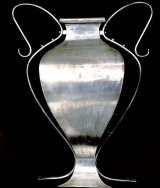
The Antique Fireplace Screen
Truly One of a Kind!
Subscribe to our Free e-Newsletter for More Exciting Fireplace Design Ideas!
Click Here for More Information




New! Comments
Have your say about what you just read! Leave me a comment in the box below.